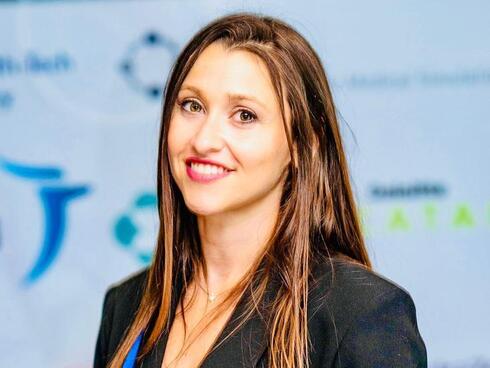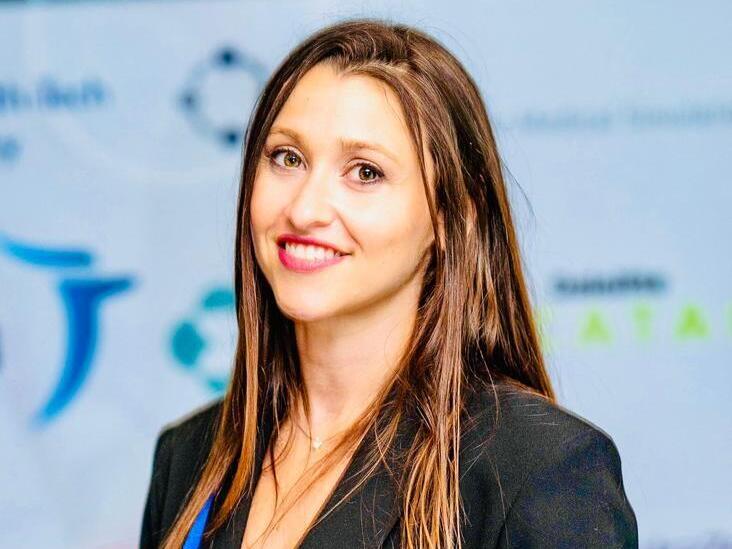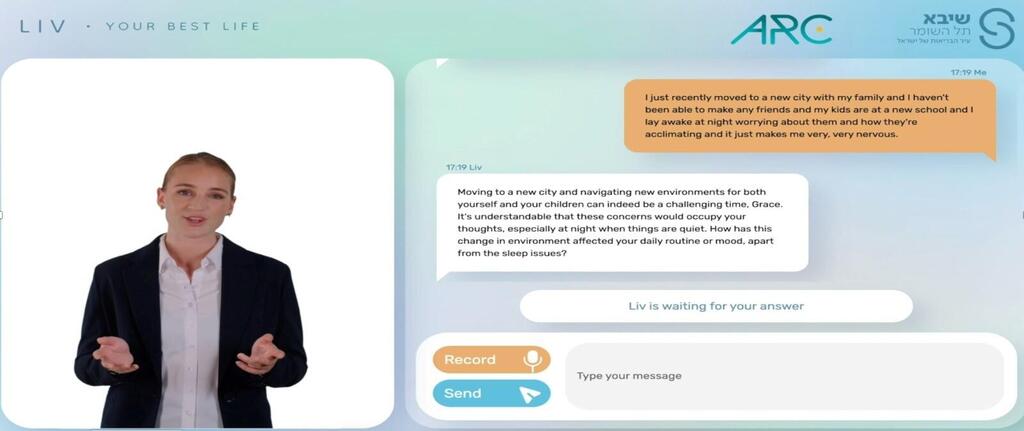
Interview
Can we talk? LIV’s GenAI gets trauma sufferers to open up
The generative AI-based platform, developed by Sheba Medical Center, ARC, Microsoft and KPMG, streamlines accessibility to mental healthcare by amplifying workflows of practitioners, reducing time to treatment amid a national surge in demand since Oct. 7.
Since October 7, the surge in demand for mental health care in Israel coupled with a shortage in the mental health workforce has created a tremendous bottleneck in the system. LIV, a new generative AI-based platform, developed by Sheba Medical Center, ARC Innovation Center, Microsoft, and KPMG, streamlines accessibility to mental healthcare by amplifying workflows of mental health practitioners, significantly reducing time to treatment.
The idea behind LIV originated in 2021, during the height of the Covid-19 pandemic, when the global mental health crisis significantly worsened. Iris Shtein, who at the time was Director of the Remote Health Care Hub at Sheba, teamed with the Deputy Director of the Psychiatric Division, Dr. Asaf Caspi and Prof. Mark Weiser, the Head of the Psychiatry Division at Sheba, in an effort to find a solution to streamline the initial vetting process, assist overburdened healthcare systems and enhance patient care through advanced technology.
According to Shtein, because the technology was “not there yet” in 2021, LIV was shelved and revived only after the tragic events of October 7. “The day after October 7th, I was sitting at home watching the news, feeling deeply traumatized,” Shtein, a native of southern Israel who had previously served in Gaza as part of the IDF’s medical core, told CTech in an interview. “But then I realized this was also a historic moment and opportunity. I immediately reunited with Dr. Caspi, Dr. Daniel Cohen, and Prof. Weiser to get the LIV project up and running again. In my then-role as Director of strategic partnerships at Sheba’s ARC Innovation Center I had dealings with Microsoft and when we reached out to them, through Microsoft Israel, they immediately agreed to work together on the project. Within just two months, we (Sheba, Microsoft and KPMG, which had also come aboard) had our first visibility study and first version of LIV ready.
The technology utilized by LIV is vital for people with PTSD, depression, anxiety and other mental health issues. Results in early tests have shown that LIV has the ability to surpass human psychiatrists in some areas. For example, the Psychiatry Division at Sheba, faced with increasing PTSD cases due to ongoing conflicts, has found LIV particularly valuable. The platform offers personalized patient interactions and effective diagnostics, helping manage the surge in mental health needs.
Iris, how does LIV work?
“Think of LIV as a psychiatric triage screening system for ‘soft’ psychiatry, which 90% of the population is dealing with or is even unaware of. First of all, it gives you someone to talk to, to share what’s troubling you, and it will provide help and support on a preliminary screening level.”
LIV is a platform with an interactive, conversational interface (it looks similar to WhatsApp Web) using both voice and written communication. You can choose to use LIV with or without an avatar (LIV is female, Shtein states proudly), tailoring the experience to the needs of each user. Utilizing the DSM-5 diagnostic criteria and adhering to the highest standards of responsible AI, LIV assists mental health professionals in diagnosing and managing conditions. LIV is currently available in Hebrew and English, but there is already demand for additional languages, including Arabic, Spanish, Portuguese and more. “It takes time as we have to adapt each language to the local slang, dialect, and work with language experts.” Shtein explains.
Does LIV replace actual therapists?
“No,” Stein states firmly. “We are not replacing those human practitioners, but rather helping them. LIV serves as a support system for making a preliminary clinical diagnosis. It’s also a huge time-saver.”
Are there actual human therapists standing by, backing up LIV?
“There need not be an actual human therapist present for the LIV session, but the data provided will always meet a human in the loop because LIV is not a stand-alone platform. However, if someone indicates they might hurt themselves or someone else or even just is not responding to LIV prompts, an alert will go out immediately to a human professional.”
Who will have access to LIV?
“We work with medical organizations, HMOs, and now even with Israeli governmental agencies, who receive the output from the user and then they can choose to navigate the patient to different journeys, to prioritize the patients, to understand which treatment would work best for them. Users can use LIV from home, but only through the medical organization. Think of all the people that could be using LIV at any given moment, freeing up the slow human screening process.”
How accurate is LIV in diagnosis?
“The accuracy of the initial diagnosis provided by LIV was 94% accurate, but in some cases it was even higher than the real psychiatrist. It was better in choosing the medications, which makes sense because LIV is connected to the most updated literature, and it was better in designating cases as far as severity: mild, moderate, or severe. And in some cases, our users stated that LIV was more sympathetic than the human psychiatrist.”
What does LIV mean for Israel, post October 7?
“In Israel the applications are immense. For example, an entire group of people from a kibbutz who were evacuated due to the war could be screened simultaneously. Israel simply cannot provide a mental health worker immediately for every person and not everyone needs to meet a psychiatrist, or at least not right away. With LIV they don’t have to wait weeks, or months, to begin the screening process. We can take the limited manpower we have right now and manage it much more efficiently.”
Are people comfortable sharing their problems with LIV?
“That’s one thing that really surprised us,” Shtein says. “We thought younger people from ages 12 and up, who tend to be more technologically inclined, would feel comfortable using LIV, but for older people, when faced with a choice between speaking to a human or to AI, most would prefer a human. But these days, with the huge demand for mental health care, but the lack of available practitioners, a human is not going to be available immediately. What we found is that older people, in fact all users, shared with LIV more, for example about their problems with substance abuse, than they normally would with a human on the other end. It’s because with LIV they don’t feel threatened or judged.”
What does the future hold for LIV?
“I am pleased to share that LIV will become its own startup company from the ARC incubator (Sheba’s innovation platform). I will soon be moving on from Sheba to become the founder and CEO of Mentaily and LIV will be the first commercial product of the company. It will still be handled by medical institutions, first responders, and HMOs, but under our new company. Sheba will continue to support it (together with Microsoft) as part of the Sheba incubator. Sheba’s Prof. Mark Weiser, Dr. Asaf Caspi, Dr. Daniel Cohen and I are the co-inventors of LIV, so we will always be deeply connected to Sheba.
“As for branches we hope to focus on in the future, I can name three: PTSD, teenagers (12,000 teens have been evacuated since Oct. 7) , and women’s mental health (including menopause, postpartum depression, depression in women going through IVF treatments).”
Will it remain an Israeli company?
“Absolutely. We are proudly Israeli. This is the Israeli story of resilience of taking the trauma we experienced since October 7 and creating something to impact the whole world. Israel is the best testing ground for our product. But for the first year we are really focused on Israel.”
Your daughter is named Liv too, so are they both your babies?
“Absolutely,” Shtein says with a laugh. “Both are my babies, and I love them both. Worrying about LIV keeps me up at night even more than my actual daughter.”















